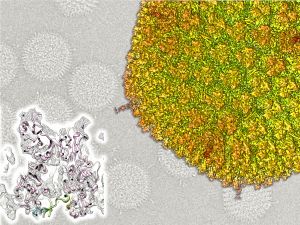Researchers from the Consejo Superior de Investigaciones Científicas have unveiled how competition between two viral proteins that are essential for virus infectivity (protein VII, involved in DNA condensation and protein VI, required to release adenovirus particles from the endosome after entering the infected cell) is critical for adenovirus maturation. The results of this work in collaboration with researchers from the Instituto de Química-Física Rocasolano (IQFR-CSIC), Centro de Investigación en Red en Enfermedades Respiratorias (CIBERES), the Universities Autónoma de Madrid, Zurich in Switzerland and Stony Brook in New York, have been published in the journal Proceedings of the National Academy of Sciences of the United States of America (PNAS).
After studying a mutant virus lacking protein VII with cryoelectron microscopy, atomic force microscopy and other techniques, the researchers propose a model explaining why competition between these two proteins is necessary to ensure virus infectivity. Furthermore, the new structural data obtained in this work represents the first observation of the lytic peptide that allows adenoviruses to escape from the endosome to keep moving through the intracellular medium. Carmen San Martín, (CNB-CSIC) stresses the relevance of this finding, since “our competition model explains previous observations on the effect of mutations in protein VI on the maturation and infectivity of adenoviruses ".
Mercedes Hernando, CNB-CSIC researcher, highlights that “proteins VI and VII compete to bind to a specific region of the viral capsid. This spatial pressure exposes them to the viral protease that cleaves proteins VI and VII, a step required for adenovirus maturation. When the protease cuts protein VI, it becomes ready to break the endosome membrane, facilitating the virus escape into the cytosol. In the absence of VII, there is no competition, VI is not cleaved by the protease, cannot break the endosome membrane and the virus is trapped”.
Dynamic competition for hexon binding between core protein VII and lytic protein VI promotes adenovirus maturation and entry. Hernando-Pérez M, Martín-González N, Pérez-Illana M, Suomalainen M, Condezo GN, Philomena Ostapchuk P, Gallardo J, Menéndez M, Greber UF, Hearing P, de Pablo PJ, San Martín C. PNAS May 28, 2020






